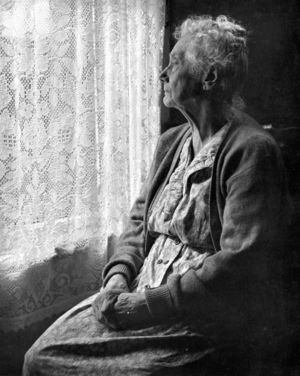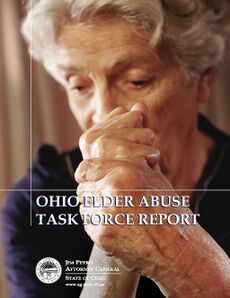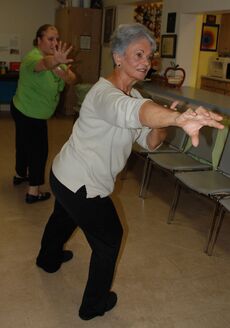Psychological Factors in Ageing: Difference between revisions
Mande Jooste (talk | contribs) m (Edit format) |
No edit summary |
||
| (27 intermediate revisions by 3 users not shown) | |||
| Line 1: | Line 1: | ||
<div class="editorbox"> | <div class="editorbox"> | ||
'''Original Editor '''- [[User:Bhanu Ramaswamy|Bhanu Ramaswamy]] as part of the [[AGILE Project|AGILE Project]]. | '''Original Editor '''- [[User:Bhanu Ramaswamy|Bhanu Ramaswamy]] as part of the [[AGILE Project|AGILE Project]]. | ||
| Line 5: | Line 7: | ||
</div> | </div> | ||
== Introduction == | == Introduction == | ||
[[File:Elderly Woman.jpg|right|frameless]]The increase in the number of [[Older People Introduction|older people]] worldwide, alongside an increase in life expectancy, has led to a more attention to the psychological factors of ageing.<ref>Frontiers Psychological Factors in Physical Activity for Healthy life and Healthy Aging Available:https://www.frontiersin.org/research-topics/29127/psychological-factors-in-physical-activity-for-healthy-life-and-healthy-aging (accessed 30.11.2022)</ref> There is a growing body of evidence suggesting that successful ageing is multidimensional, including a level of psychological, physical and social, and well-being.<ref>Britton A, Shipley M, Singh‐Manoux A, Marmot MG. Successful aging: The contribution of early‐life and midlife risk factors. Journal of the American Geriatrics Society. 2008 Jun;56(6):1098-105. Available: https://www.sciencedirect.com/science/article/pii/B9780123749376000024<nowiki/>(accessed30.11.2022)</ref> | |||
The field of geropsychology is becoming increasingly important as populations age. Geropsychology is a specialty that focuses on understanding, treating, and improving the [[Mental Health|mental health]] of older adults.<ref>Psychology today What Is Geropsychology? Available:https://www.psychologytoday.com/us/blog/lifespan-perspectives/202011/what-is-geropsychology (accessed 1.12.2022)</ref> Currently many seniors with mental health issues may not be receiving the right treatment. Prompt recognition and treatment of mental health issues in older adults is essential. Psychosocial interventions and medicines are recommended.<ref name=":0" /> | |||
== Mental Health and Psychological Changes == | |||
Mental health and well-being are as important in older age as at any other time of life. [[:Category:Mental Health|Mental]] and [[Neurological Disorders|neurological disorders]] among older adults account for 6.6% of the total disability ([[Disability-Adjusted Life Year|DALYs]]) for this age group. Approximately 15% of adults aged 60 and over suffer from a mental disorder. | |||
Psychosocial problems include: | |||
# Poor adjustment to role changes. | |||
# Poor adjustment to lifestyle changes. | |||
# Family relationship problems. | |||
# Grief. | |||
# Low self-esteem. | |||
# Anxiety and [[depression]]. | |||
# Aggressive behavior.<ref>Short facts What are psychological factors of aging? Available: https://short-facts.com/what-are-psychological-factors-of-aging/ (accessed 30.11.2022)</ref> | |||
== Risk Factors == | |||
Older people may experience the same life stressors common to all people, however they have additional stress in the form of eg a significant ongoing loss in capacities and a decline in functional ability. Older adults may experience reduced mobility, [[Chronic Pain|chronic pain]], [[Introduction to Frailty|frailty]], [[diabetes]], [[Hearing in the Elderly|hearing loss]], [[osteoarthritis]] or other health problems, all requiring some form of long-term care. In addition, older people are more likely to experience events such as bereavement, or a drop in socioeconomic status with retirement. Sadly these stressors can result in isolation, loneliness or psychological distress in older people. | |||
Mental health has an impact on physical health and vice versa. For example, older adults with physical health conditions such as [[Coronary Artery Disease (CAD)|heart disease]] have higher rates of depression than those who are healthy. Additionally, untreated depression in an older person with heart disease can negatively affect its outcome.<ref name=":0">WHO Mental health of older adults Available: https://www.who.int/news-room/fact-sheets/detail/mental-health-of-older-adults (accessed 30.11.2022)</ref> | |||
== Empathy == | |||
For most of us who are in a general setting, dealing with complex emotions in rehabilitation is vital, as many factors will affect involvement and participation with treatment. Many treatments for those with mental health problems are no different from those used to solve physical problems with client groups elsewhere; however, the approach taken may need to reflect the person’s individual health needs. Overall, patience and empathy are a must (with good listening/counselling skills with both client and carers), as are re-orientation to the individual’s environment, and an understanding of their behaviour. | |||
== Elder Abuse == | |||
[[File:Elder Abuse Task Force report.jpeg|right|frameless|298x298px]] | |||
Elder abuse is a single or repeated act, or lack of appropriate action, occurring within any relationship where there is an expectation of trust, which causes harm or distress to an older person. This type of violence amounts to a violation of human rights.<ref name=":1">WHO Elder Abuse Available:https://www.who.int/news-room/fact-sheets/detail/abuse-of-older-people (accessed 1.12.2022)</ref> Older adults are at risk of elder abuse, in its many form eg | |||
* Physical, verbal, psychological, financial or sexual abuse | |||
* Abandonment; | |||
* Neglect | |||
* Serious losses of dignity and respect. | |||
Current evidence suggests that 1 in 6 older people experience elder abuse. Elder abuse can have serious physical and mental health, financial, and social consequences, including, for instance, physical injuries, premature mortality, depression, cognitive decline, financial devastation and placement in aged care facilities.<ref name=":0" /><ref name=":1" /> | |||
The | == Dementia and Depression == | ||
The most common mental and neurological disorders in older people are dementia and depression, which affect approximately 5% and 7% of the world’s older population, respectively.<ref name=":0" /> | |||
#[[Depression]]: may cause great distress and leads to impaired functioning in daily life. Depression is underdiagnosed and undertreated in primary care settings. Symptoms are often missed and untreated because they co-occur with other problems meet by older adults. Older people with depressive symptoms have function worse in comparison to those with chronic medical conditions such as lung disease, hypertension or diabetes. Depression also increases the perception of poor health, the utilization of health care services and costs.<ref name=":0" /> | |||
#[[Dementia]] is an umbrella term used for signs and symptoms characterised by a generalised and irredeemable impairment of intellect, memory and personality. The decline is permanent and progressive. It mainly affects the elderly, although it is not a normal part of ageing. It is estimated that 50 million people globally live with dementia with nearly 60% living in low- and middle-income countries. The total number of people with dementia is projected to increase to 82 million in 2030 and 152 million in 2050.<ref name=":0" /> | |||
== Bereavement == | |||
[[File:Grief.jpeg|thumb|Grief]] | |||
As people get older there is an increased likelihood of them experiencing bereavement. Grief is the natural response to the death of a loved one and is encountered frequently in clinical practice with the elderly. Acute grief normally evolves over time into integrated grief. Sometimes grief may be prolonged, severe and impairing. This failure of adaptation to grief results in Prolonged Grief Disorder (PGD) which has been recently included in ICD-11. The hallmark feature of PGD is intense longing for the deceased or persistent preoccupation with the deceased that lasts longer than 6 months after the death.<ref>Meichsner F, O'Connor M, Skritskaya N, Shear MK. Grief before and after bereavement in the elderly: an approach to care. The American Journal of Geriatric Psychiatry. 2020 May 1;28(5):560-9.Available:https://www.ajgponline.org/article/S1064-7481(19)30590-1/fulltext (accessed 1.12.2022)</ref> | |||
</ | |||
* Unfortunately, older people may be reluctant to discuss their mental health and grief with their family, GP or other care staff. Grief in older people may, consequently, go undetected and untreated. | |||
* Older people who have experienced the death of a partner are up to four times more likely to experience depression than older people who have not lost there partner.<ref>Independent age Older bereaved people are up to four times more likely to experience depression, but less likely to receive support, according to new report Available:https://www.independentage.org/news-media/press-releases/older-bereaved-people-are-up-to-four-times-more-likely-to-experience (accessed 30.11.2022)</ref> <ref>NARI Grief in older people and its effect on healthcare use Available:https://www.nari.net.au/grief-in-older-people (accessed 30.11.2022)</ref> | |||
== Disability == | |||
Consider the psychological factor of adjustment to physiological change that has left a [[Ageing and Disabilities|disability]], for example: | |||
# A [[stroke]]. It may mean lifestyle changes such as having a bed downstairs, leading to loss of privacy, or having to give up driving, leading to isolation. | |||
# A major disability may also alter the person's position or status within the family, for example, a change from being a carer to being cared for may lead to low esteem. | |||
Healthcare professionals may sometimes overlook the acceptance of these changes as the priority is normally to deal with the physical disability. If the physiotherapist has knowledge of the possible psychological consequences they can refer on to colleagues and ensure a [[Holistic Healthcare Interventions for Children|holistic]] approach to person-centred care is maintained. | |||
<div class="discussionpointbox"> | |||
== Physiotherapy == | |||
[[File:Taoist Tai Chi class.jpg|thumb|328x328px|Tai Chi, improves well being]]While the majority of attention in the life extension and successful ageing field has concentrated on physical factors, eg. [[Therapeutic Exercise|exercise]], diet, [[Sleep: Older People|sleep]], genetics, we need to increase our knowledge on the interaction between psychology, physical activity and health. In particular on the benefits of [[Physical Activity|physical activity]] practice on psychological health in the aged. | |||
Being active is good for mental health. Exercise releases chemicals in the brain increasing a sense of well being eg boosting self-esteem, helping with concentration, improving sleep. This is an area a physiotherapist have a role, as our expertise being most beneficial. Simply educating people on the mental health benefits is a starting point. | |||
For more see | |||
# | # [[Physical Activity and Older Adults|Physical Activity and Older People]] | ||
# | # [[Mental Health, Physical Activity and Physical Therapy]] | ||
'''Further Reading'''The Social Care Institute for Excellence site (SCIE) is still running a page about ageing, discrimination and mental health in older people. Access this and information sheets at: http://www.scie.org.uk/publications/elearning/mentalhealth/mh08/index.asp | |||
</div> | |||
== References == | == References == | ||
<references /><br> | <references /><br> | ||
[[Category:Occupational Health]] | |||
[[Category:Older_People/Geriatrics]] | [[Category:Older_People/Geriatrics]] | ||
[[Category:Older People/Geriatrics - Conditions]] | |||
[[Category:Global_Health]] | [[Category:Global_Health]] | ||
[[Category:Mental Health]] | [[Category:Mental Health]] | ||
[[Category: | [[Category:Conditions]] | ||
[[Category:Mental Health - Conditions]] | |||
[[Category:AGILE Project]] | |||
Latest revision as of 02:43, 1 December 2022
Original Editor - Bhanu Ramaswamy as part of the AGILE Project.
Top Contributors - Admin, Lucinda hampton, Kim Jackson, Mande Jooste, Evan Thomas, Amrita Patro, Amanda Ager and Lauren Lopez
Introduction[edit | edit source]
The increase in the number of older people worldwide, alongside an increase in life expectancy, has led to a more attention to the psychological factors of ageing.[1] There is a growing body of evidence suggesting that successful ageing is multidimensional, including a level of psychological, physical and social, and well-being.[2]
The field of geropsychology is becoming increasingly important as populations age. Geropsychology is a specialty that focuses on understanding, treating, and improving the mental health of older adults.[3] Currently many seniors with mental health issues may not be receiving the right treatment. Prompt recognition and treatment of mental health issues in older adults is essential. Psychosocial interventions and medicines are recommended.[4]
Mental Health and Psychological Changes[edit | edit source]
Mental health and well-being are as important in older age as at any other time of life. Mental and neurological disorders among older adults account for 6.6% of the total disability (DALYs) for this age group. Approximately 15% of adults aged 60 and over suffer from a mental disorder.
Psychosocial problems include:
- Poor adjustment to role changes.
- Poor adjustment to lifestyle changes.
- Family relationship problems.
- Grief.
- Low self-esteem.
- Anxiety and depression.
- Aggressive behavior.[5]
Risk Factors[edit | edit source]
Older people may experience the same life stressors common to all people, however they have additional stress in the form of eg a significant ongoing loss in capacities and a decline in functional ability. Older adults may experience reduced mobility, chronic pain, frailty, diabetes, hearing loss, osteoarthritis or other health problems, all requiring some form of long-term care. In addition, older people are more likely to experience events such as bereavement, or a drop in socioeconomic status with retirement. Sadly these stressors can result in isolation, loneliness or psychological distress in older people.
Mental health has an impact on physical health and vice versa. For example, older adults with physical health conditions such as heart disease have higher rates of depression than those who are healthy. Additionally, untreated depression in an older person with heart disease can negatively affect its outcome.[4]
Empathy[edit | edit source]
For most of us who are in a general setting, dealing with complex emotions in rehabilitation is vital, as many factors will affect involvement and participation with treatment. Many treatments for those with mental health problems are no different from those used to solve physical problems with client groups elsewhere; however, the approach taken may need to reflect the person’s individual health needs. Overall, patience and empathy are a must (with good listening/counselling skills with both client and carers), as are re-orientation to the individual’s environment, and an understanding of their behaviour.
Elder Abuse[edit | edit source]
Elder abuse is a single or repeated act, or lack of appropriate action, occurring within any relationship where there is an expectation of trust, which causes harm or distress to an older person. This type of violence amounts to a violation of human rights.[6] Older adults are at risk of elder abuse, in its many form eg
- Physical, verbal, psychological, financial or sexual abuse
- Abandonment;
- Neglect
- Serious losses of dignity and respect.
Current evidence suggests that 1 in 6 older people experience elder abuse. Elder abuse can have serious physical and mental health, financial, and social consequences, including, for instance, physical injuries, premature mortality, depression, cognitive decline, financial devastation and placement in aged care facilities.[4][6]
Dementia and Depression[edit | edit source]
The most common mental and neurological disorders in older people are dementia and depression, which affect approximately 5% and 7% of the world’s older population, respectively.[4]
- Depression: may cause great distress and leads to impaired functioning in daily life. Depression is underdiagnosed and undertreated in primary care settings. Symptoms are often missed and untreated because they co-occur with other problems meet by older adults. Older people with depressive symptoms have function worse in comparison to those with chronic medical conditions such as lung disease, hypertension or diabetes. Depression also increases the perception of poor health, the utilization of health care services and costs.[4]
- Dementia is an umbrella term used for signs and symptoms characterised by a generalised and irredeemable impairment of intellect, memory and personality. The decline is permanent and progressive. It mainly affects the elderly, although it is not a normal part of ageing. It is estimated that 50 million people globally live with dementia with nearly 60% living in low- and middle-income countries. The total number of people with dementia is projected to increase to 82 million in 2030 and 152 million in 2050.[4]
Bereavement[edit | edit source]
As people get older there is an increased likelihood of them experiencing bereavement. Grief is the natural response to the death of a loved one and is encountered frequently in clinical practice with the elderly. Acute grief normally evolves over time into integrated grief. Sometimes grief may be prolonged, severe and impairing. This failure of adaptation to grief results in Prolonged Grief Disorder (PGD) which has been recently included in ICD-11. The hallmark feature of PGD is intense longing for the deceased or persistent preoccupation with the deceased that lasts longer than 6 months after the death.[7]
- Unfortunately, older people may be reluctant to discuss their mental health and grief with their family, GP or other care staff. Grief in older people may, consequently, go undetected and untreated.
- Older people who have experienced the death of a partner are up to four times more likely to experience depression than older people who have not lost there partner.[8] [9]
Disability[edit | edit source]
Consider the psychological factor of adjustment to physiological change that has left a disability, for example:
- A stroke. It may mean lifestyle changes such as having a bed downstairs, leading to loss of privacy, or having to give up driving, leading to isolation.
- A major disability may also alter the person's position or status within the family, for example, a change from being a carer to being cared for may lead to low esteem.
Healthcare professionals may sometimes overlook the acceptance of these changes as the priority is normally to deal with the physical disability. If the physiotherapist has knowledge of the possible psychological consequences they can refer on to colleagues and ensure a holistic approach to person-centred care is maintained.
Physiotherapy[edit | edit source]
While the majority of attention in the life extension and successful ageing field has concentrated on physical factors, eg. exercise, diet, sleep, genetics, we need to increase our knowledge on the interaction between psychology, physical activity and health. In particular on the benefits of physical activity practice on psychological health in the aged.Being active is good for mental health. Exercise releases chemicals in the brain increasing a sense of well being eg boosting self-esteem, helping with concentration, improving sleep. This is an area a physiotherapist have a role, as our expertise being most beneficial. Simply educating people on the mental health benefits is a starting point.
For more see
Further ReadingThe Social Care Institute for Excellence site (SCIE) is still running a page about ageing, discrimination and mental health in older people. Access this and information sheets at: http://www.scie.org.uk/publications/elearning/mentalhealth/mh08/index.asp
References[edit | edit source]
- ↑ Frontiers Psychological Factors in Physical Activity for Healthy life and Healthy Aging Available:https://www.frontiersin.org/research-topics/29127/psychological-factors-in-physical-activity-for-healthy-life-and-healthy-aging (accessed 30.11.2022)
- ↑ Britton A, Shipley M, Singh‐Manoux A, Marmot MG. Successful aging: The contribution of early‐life and midlife risk factors. Journal of the American Geriatrics Society. 2008 Jun;56(6):1098-105. Available: https://www.sciencedirect.com/science/article/pii/B9780123749376000024(accessed30.11.2022)
- ↑ Psychology today What Is Geropsychology? Available:https://www.psychologytoday.com/us/blog/lifespan-perspectives/202011/what-is-geropsychology (accessed 1.12.2022)
- ↑ 4.0 4.1 4.2 4.3 4.4 4.5 WHO Mental health of older adults Available: https://www.who.int/news-room/fact-sheets/detail/mental-health-of-older-adults (accessed 30.11.2022)
- ↑ Short facts What are psychological factors of aging? Available: https://short-facts.com/what-are-psychological-factors-of-aging/ (accessed 30.11.2022)
- ↑ 6.0 6.1 WHO Elder Abuse Available:https://www.who.int/news-room/fact-sheets/detail/abuse-of-older-people (accessed 1.12.2022)
- ↑ Meichsner F, O'Connor M, Skritskaya N, Shear MK. Grief before and after bereavement in the elderly: an approach to care. The American Journal of Geriatric Psychiatry. 2020 May 1;28(5):560-9.Available:https://www.ajgponline.org/article/S1064-7481(19)30590-1/fulltext (accessed 1.12.2022)
- ↑ Independent age Older bereaved people are up to four times more likely to experience depression, but less likely to receive support, according to new report Available:https://www.independentage.org/news-media/press-releases/older-bereaved-people-are-up-to-four-times-more-likely-to-experience (accessed 30.11.2022)
- ↑ NARI Grief in older people and its effect on healthcare use Available:https://www.nari.net.au/grief-in-older-people (accessed 30.11.2022)










